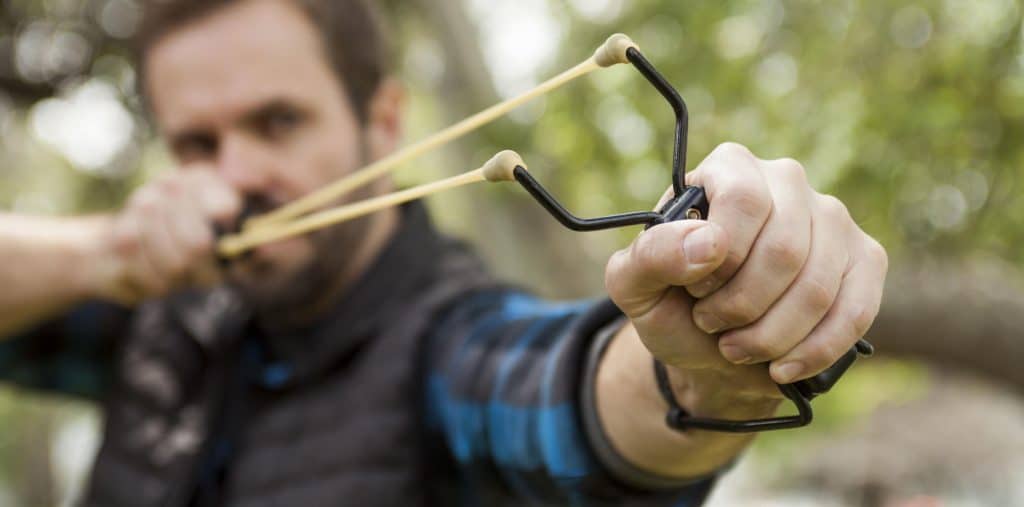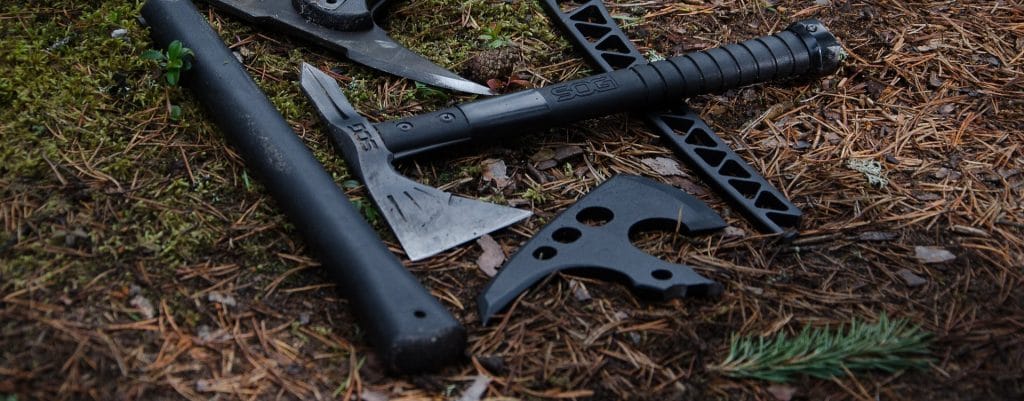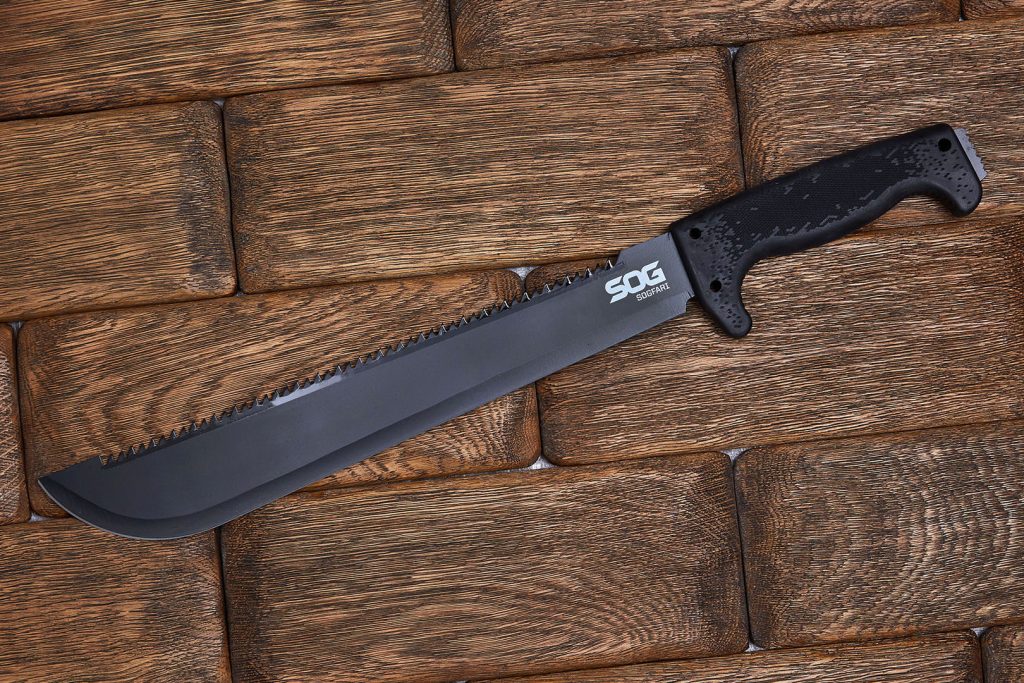

Anyone who is considering going camping or hiking should have a backpacking hatchet. Quite distinct from regular axes, backpacking hatchets are portable hatchets that can be attached to the belt or put in a bag for easy carrying. They are perfect for use in the woods and for field tasks out in the yard. The best backpacking hatchet is light, durable, and versatile: you can use it to build a shelter, hammer in the pegs of your tent, chop wood, split kindling, or even chop your meat if you forget a knife, not forgetting that it can also be a nifty weapon should you need to defend yourself.
This review looks at what to consider when buying a hatchet. We’ve included all the important features in a hatchet and tell you why they matter. We cover things like the weight, head weight, handle length, handle and head material, and balance, and show you how to choose a hatchet based on each of these.
We set off to identify the types of backpacking hatchets in the market currently and what they’re capable of. We talked to people who’ve used them for years and others who have only begun using them. It took us months of analyzing, comparing, and experimenting with different hatchets, but we’re confident in the outcome of our research. We present our results in an easy-to-follow structure featuring a comparison table of the 7 best options with the Hults Bruk Jonaker Hatchet as our Editor’s Choice, in-detail reviews of each hatchet, and a comprehensive buying guide to help you find the right backpacking hatchet for your lifestyle.
More features: curved handle, sheath included The Hults Bruk Jonaker Hatchet is a little hand-forged hatchet that weighs only 1.5 pounds. The head is carved from solid Swedish steel and weighs 1 pound. Great workmanship and forging yields a strong, sturdy head that is bound to serve you for years. The manufacturer explains that to attain this level of hardness, the steel passes through a hand grinding process where it is struck numerous times to bolster density and durability. The cutting edge is sharp and cuts through surfaces swiftly and smoothly. Given the high quality of the steel used to make the blade, we anticipate it’ll retain this sharpness for a considerable length of time. The handle is carved from American hickory and measures 9.4 inches long, making it perfect for light jobs like splitting kindling and carving. To condition and preserve the wood quality of the handle, it is treated with linseed oil, which also protects it from moisture damage. You’ll need to regularly treat yours with linseed oil to maintain the good quality of the handle. Hults Bruk includes an embellished protective leather sheath which fits snugly on the blade. More features: vegetable-tanned leather sheath included, 20-year guarantee The Gränsfors Bruks Hand Hatchet is a perfect backpacking candidate for anyone who is on the trail regularly. It’s lightweight at only 1.4 pounds, a negligible weight that will allow you to carry the hatchet with you on any camping or hiking trip. The head alone weighs 1 pound and perfectly balances the handle. It has a long, sharp blade that is easy to sharpen and is made from Swedish steel. The first thing you notice about the head is how tough and hardy it is. And while this gives it guaranteed durability, it also makes the blade prone to chipping, so keep your sharpening stone nearby for regular touch-ups to maintain the blade sharpness. The handle measures 9 inches, making it suitable for splitting small woods only; this short handle doesn’t give it the swinging leverage required to chop large woods. It’s made from American hickory and is dense and strong. It comes in a smooth, linseed oil treated finish, which you can maintain by regularly treating it with boiled linseed oil. Gransfors Bruks includes a free vegetable-tanned leather blade sheath and an ax book with every purchase. They also give a 20-year warranty, so you enjoy nearly a lifetime of service and support from the manufacturer. More features: spike pommel, nail pull/pry bar, sheath included The Schrade SCAXE5 is one of the coolest tactical hatchets you can get for just over $60. It’s multifunctional and will serve you well in most emergency situations. But even if you’re not anticipating any mishaps that would call for use of the pry bar or spike pommel, it does a fine splitting job and will quickly help you chop small wood or carve stakes. The blade is sharp and won’t need sharpening for a while after you buy. It’s secured onto the handle using a hand and finger-shaped grip that eliminates any possibility that it would slip and come loose. The head is made from high carbon steel and is firmly joined to the handle. The handle itself is made from durable nylon fiber and should give you years of satisfactory service. The slightly curved handle design ensures a power swing that’s useful when chopping harder woods. If you’re hoping to use this hatchet for moderate to heavy duty chopping tasks, it may disappoint you as the small handle does not deliver the most powerful swing for such tasks. The 9-inch handle supports most light jobs well, though. It comes with a free sheath and a lifetime warranty. More features: leather sheath included The Hults Bruk Tarnaby Hatchet is a solidly constructed little piece that will get you through any camping trip. Made from solid Swedish steel, this hatchet feels well-balanced in the hands and lifts with an unusual ease. It weighs only 2.25 pounds, with 1.2 of this weight concentrated on the head and the rest evenly distributed along the handle. This balance explains why it’s easy to lift and use. The blade is 3.5 long and includes a tempered zone that ensures the cutting edge stays sharp regardless of how often you sharpen it. The handle measures 15 inches long, making it ideal for most light wood chopping tasks and myriad other field chores. The handle is hand-shaped from American hickory, smoothly finished, and given a linseed seed treatment for quality preservation and protection. It’s smooth and ensures a comfortable grip during use. Hults Bruk includes a free leather heath that is a snug fit for the head. It holds well and does not come loose or drop out as you move about. You also get a 20-year warranty on workmanship and manufacturing defects. This is one of the best warranties on hatchets in the market; you certainly won’t have anything to complain about to this end. More features: hand-made, cow-leather sheath included The CAMAQUI Hatchet comes in two styles: Northern and Eastern. The Eastern style is lighter in weight at 1.88 pounds, has a smaller head and slimmer handle, and features a rose wood handle. The Northern style unit is slightly heavier at 2.10 pounds and has a larger head and handle, with the handle made from hickory. All other features in the two styles of hatchet are similar. The hatchet is hand-forged, with each unit bearing its own unique look that is distinct from any other hand-carved unit. For anyone who values the authenticity of handmade products, this is an added plus, not to mention that it makes a great gift. The ergonomic handle is slightly curved for perfect grip. Weight is evenly distributed between the head and handle, the result of which is a well-balanced hatchet with a perfect power-to-weight ratio. At 13.5 inches long, the handle is long enough to deliver a mildly powerful swing, enough to split most average-sized woods. It comes with a free, heavy-duty cow leather sheath for the blade. The company does not include a warranty, but it gives a 100% money-back guarantee. If you’re dissatisfied with any aspect of the hatchet, contact them and they will refund your money in full. More features: PTFE coated blade, sheath included The 9-inch Gerber Hatchet is a compact, light hatchet that weighs only 1.1 pounds. If you’re looking to spend little on a backpacking hatchet that will get most small jobs done, this would be a good choice. The head is made from forged steel and features a sharp, 2.7-inch blade that lodges deep inside wood for faster chopping. PTFE coating on the blade boosts weather and corrosion resistance, and minimizes friction, keeping the edge sharp and ensuring clean chops. It also keeps the blade from sticking in wood, so that you chop faster and efficiently. It has a glass-filled nylon handle that offers durability and high shock-absorbency, ensuring your comfort during use. In case of overstrike, this shock-absorbing handle provides protection against overstrike injury. A handle over-mold at the end provides a comfortable, soft grip and ensures your hand doesn’t slip. Because of its smaller handle (it measures 9 inches), it’s best used for splitting and chopping small woods. Gerber gives a plastic sheath for the blade which, admittedly, is of an inferior quality to the leather sheaths we’ve come to expect from competing brands. It makes up for this with a limited lifetime warranty on the hatchet. More features: thermoplastic belt sheath included The Schrade SCAXE2G is a aesthetically-designed hatchet with an ergonomic handle whose firm grip eliminates the likelihood of a hand slip during use. It features a stainless steel head that is smoothly finished and an easy-to-sharpen blade. The blade is razor sharp out of the box and does not require additional sharpening until much later when it starts to get dull. The head is coated in titanium for extra durability and wear and corrosion resistance. The handle is made from fiberglass and rubber and feels firm and smooth to the touch. It is curved, with circular embeddings that boost grip and a knob at the end to keep your hand from slipping. The combination of rubber and fiberglass blocks all forms of vibration from reaching your hand, ensuring your comfort. This hatchet weighs a paltry 1.3 pounds and you can comfortably take it with you on the trail. It feels well-balanced in your hands, with the 1-pound head perfectly matching the weight of the handle. The handle measure 5.2 inches, making it small enough for light carving and splitting, and chopping that doesn’t involve large woods. The outermost half of the handle gives a slight green glow in the dark, a welcome illuminating quality that lets you know exactly where the hatchet is at all times and ensures you don’t accidentally step on it.Quick Summary
Top 7 Backpacking Hatchets Review 2025
Hults Bruk Jonaker Hatchet
Gränsfors Bruks Hand Hatchet
Schrade SCAXE5
Hults Bruk Tarnaby Hatchet
CAMAQUI Hatchet
Gerber Hatchet
Schrade SCAXE2G
Now that you know the different ways a backpack hatchet can come in handy for you, it’s time to go deeper and understand how to choose one. This buying guide answers all your questions regarding what makes a good hatchet, the features that count, and tips on how to use and maintain your hatchet.
If you’re an outdoorsy person, you probably own a camp axe or hatchet already. If you’re only beginning to embrace an outdoor lifestyle and are slowly building up your arsenal of survival gear, the backpacking hatchet is something you definitely want to consider, not only because it’s small and portable, but also for its versatility.
With a hatchet, you can chop smaller trees with ease, you can split wood for kindle, you can effortlessly hammer on the pegs of your tent, and you can even chop food if cooking your meals from scratch. A hatchet is also a weapon in case you need to defend yourself when out in the woods. All valid reasons to have a hatchet and, more importantly, its usage isn’t limited to the woods. You can use the hatchet to split wood in your backyard and to accomplish other maintenance chores in your yard or farm.
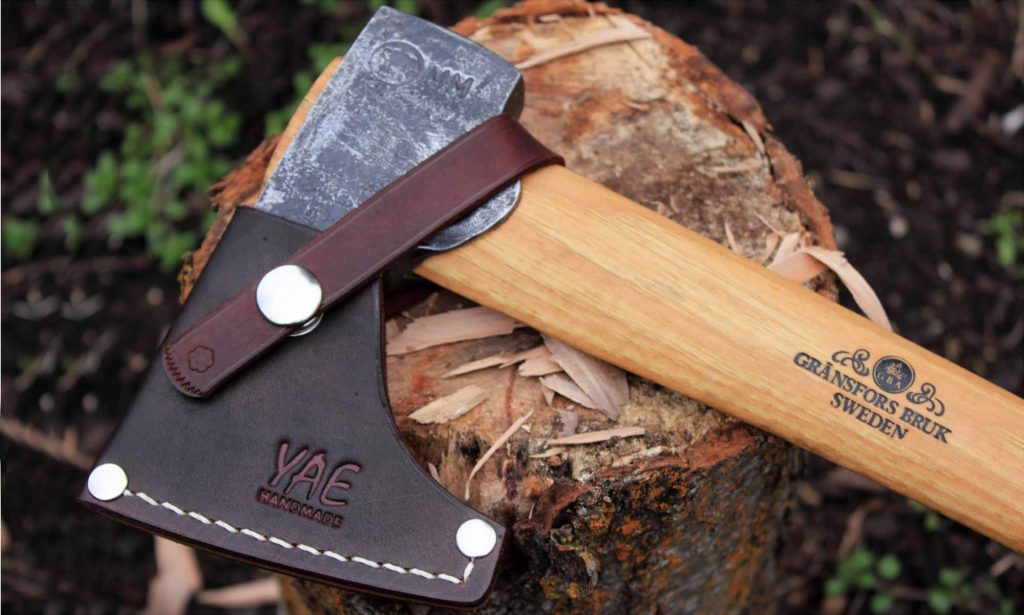
Cutting edge. This is the sharpened edge of the ax blade and is the part responsible for splitting wood.
Butt. This is the flattened edge of the ax blade and is located on the opposite end of the cutting edge. In most cases, the butt plays the role of a hammer.
Bit. This is the angled part of the head and largely refers to the ax blade.
Eye. This is a small opening at the top of the head where the handle sticks through. It’s commonly seen in designs where the head and handle are separate.
Haft. This refers to the entire length of the handle, from where the head joins the handle to the end knob. It’s where you place your hands when using the hatchet.
End knob. This is the curved end of the handle. It’s so designed to keep your hands from slipping and dropping the hatchet during use.
Your hatchet blade will need sharpening every now and then to maintain the sharpness of the cutting edge. It’s only natural for the blade to become blunt with regular use, but you can restore its sharpness by sharpening it on an emery file or heavy duty sharpener. When filing the blade, take care not to overheat it as this can further damage the blade.
You should also use the same number of strokes on both sides of the edge so that one side doesn’t become more beveled than the other.
Begin by filing away on the coarse side of the sharpening puck. This will smooth any chips and scratches on the blade. Work on one side and then turn over to the other side. Once all chips are aligned, move to the smooth side of the puck and, working on one side of the blade first then the other, file away until it attains the desired sharpness.
Before storage, wipe the ax head with a little machine oil to protect it from the elements. You may also use gun oil. Choose an oil variant that is designed to dry after application so that it doesn’t leave an oily residue on the head.
To protect your wooden handle from moisture damage, wipe it with linseed oil regularly. Using boiled linseed oil instead of regular linseed oil will keep the handle dry and in this way will not attract dust.
Let’s look at the individual features that matter in a backpacking hatchet and what to look for when buying one.
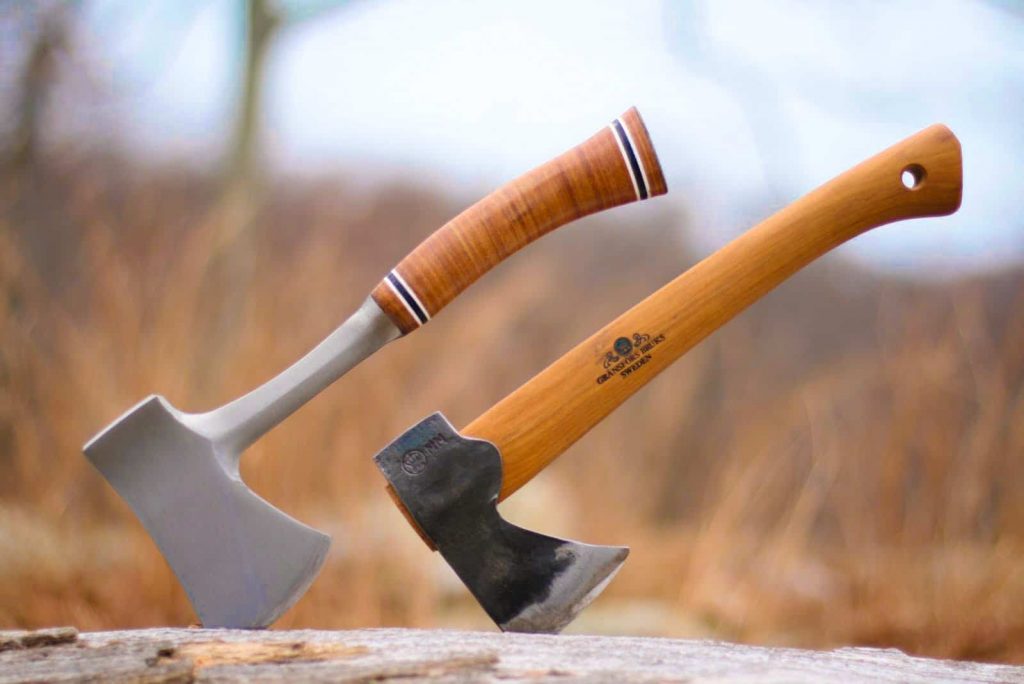
Survival hatchet. This is a small, single-handed use hatchet with a short shaft. It’s ideal for cutting small logs, splitting wood, and hammering, but because of its small handle, it doesn’t chop large logs well. An example of such a tool will be Schrade SCAXE2G.
Camping hatchet. This is a mid-sized hatchet with a long shaft, designed for two-handed use. It has a large blade for chopping or splitting wood and a wide-enough butt for easy hammering. It’s heavier than a survival hatchet and may not fit in tiny bags.
Tactical hatchet. This is a tomahawk-style hatchet that can be used as a weapon. It also does a fine wood chopping and splitting job.
Throwing hatchet. Another tomahawk-style hatchet that is superbly balanced. As the name implies, it is designed for throwing, and embeds itself on whatever object it’s thrown at. It has a small, dull blade and doesn’t chop wood well, but it’s great at hammering.
When looking at size, you have the blade and handle size to consider. The blade should be big enough for easy chopping and splitting of wood. If you choose a hatchet with a small blade, you may use more effort to split wood and the hatchet may not be useful at all in splitting large logs.
Hatchet handles range from 8-36 inches in length. Longer handles split wood better, are easier to handle when chopping big logs, and offer greater versatility in use. The downside is they’re heavier than hatchets with small handles. Smaller hatchets, while light, are limiting in that they may not chop large logs and, when they do, will require you to expend lots of energy. This type is best for occasional use. It’s safer to opt for a mid-length handle that will allow you to do everything and are not too heavy.
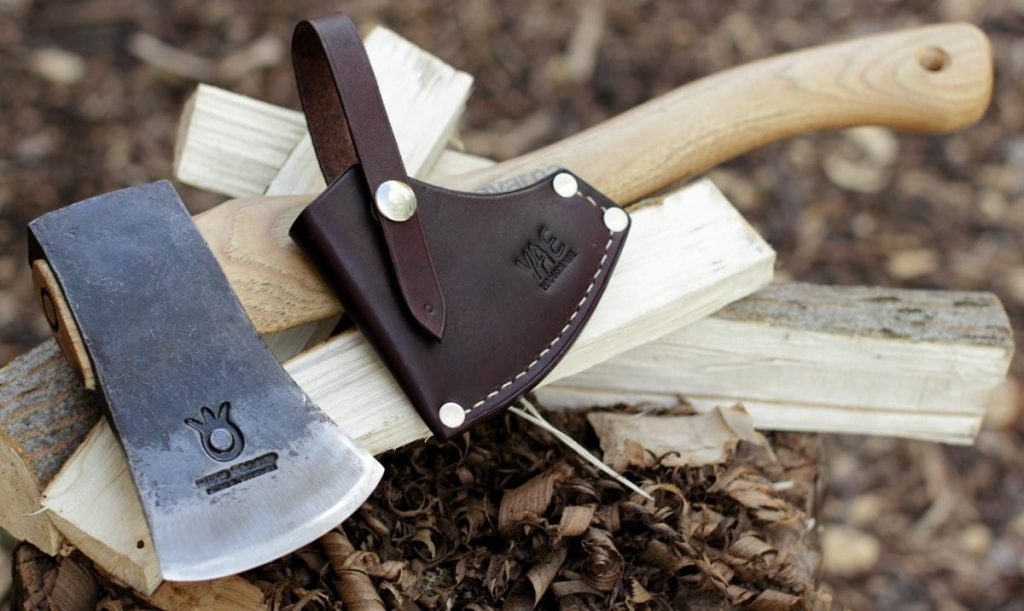
Carbon steel. The hardiest steel variant, consisting only of carbon and iron. It comes in low, medium, and high-level carbon concentrations, and is heat-tempered to minimize risk of breakage. For hatchet blades, only medium and high-level carbon grades are used, and these are mostly graded 1065-1095.
Alloy steels. These are a combination of iron, carbon, chromium and other metals like copper, cobalt, nickel, manganese, sulfur, silicon, tungsten, or vanadium, among others. They have medium-level carbon and a significant amount of chromium, but not as much as in stainless steel. They’re tough, hardened, shock resistant, and impact enduring.
Stainless steel. A carbon and iron alloy that contains at least 10.5% chromium, stainless steel is fairly soft with a moderate edge retention compared to the other types of steel. It’s usually combined with metals like nickel to improve its hardness. The most common grade for hatchets is 420 Stainless Steel. It’s corrosion-resistant and stands up well to the elements.
The handle of backpacking hatchets is generally made from fiberglass or wood. A few models may have a metal handle, but these tend to be quite heavy and are unsuitable for camping where you’d need to constantly take the hatchet with you.
Fiberglass offers numerous advantages over wood. It’s durable, lightweight, and doesn’t splinter easily. The disadvantage is that once it’s damaged, it cannot be repaired. You have to replace it.
Wooden handles can be repaired or replaced easily. They’re easy to carry if light. But they can also be heavy. They are also prone to splintering, overstrike damage, and can be slippery depending on the finishing done.
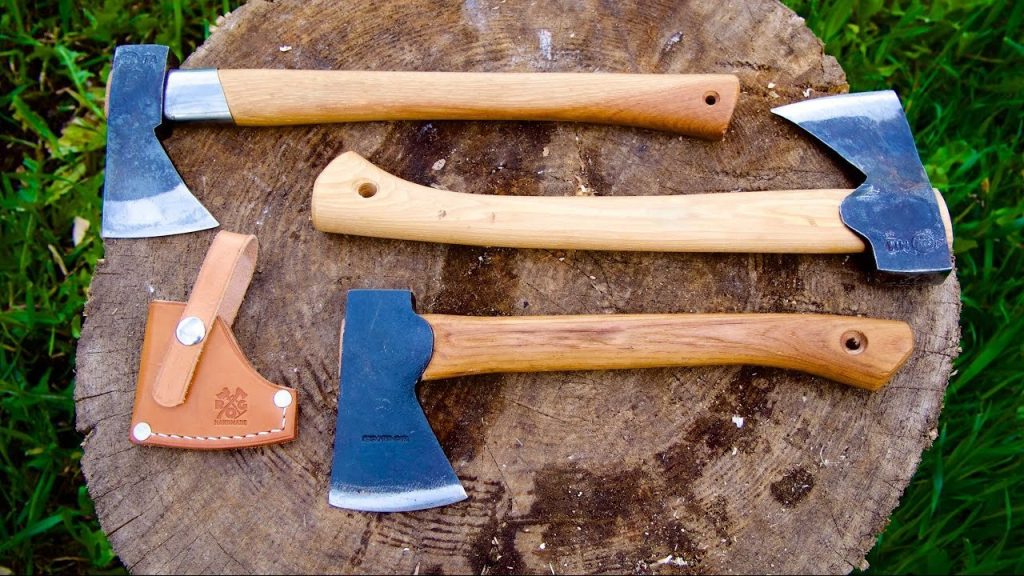
If you won’t be hiking much and only intend to use the hatchet near your house, you may compromise a little and go for a heavier hatchet such as the Hults Bruk Tarnaby Hatchet.
Go for a well-balanced hatchet like the Gränsfors Bruks Hand Hatchet, one where the weight is evenly distributed between the head and the handle. Such a hatchet will feel good in your hands and delivers the maximum force needed to split wood when you bring it down. A hatchet where the head is heavier than the handle and vice versa will be unwieldy and may not chop wood as well as you’d like.
A good hatchet is out-of-the-factory sharp, but it stays sharp longer and is easy to sharpen when it becomes blunt. This has a lot to do with the type of steel used to make the blade so check the material before making a decision to buy.

A blade sheath to ensure you don’t injure yourself or accidentally cut objects during storage.
Overstrike protector to protect the haft in case of a missed target.
File or sharpening stone for easy blade sharpening on the go.
Extra wedges for easy repair work.
Multiple hammer faces to help with different hammering usages.
If you’re looking for something you can use over the long term or one that’s ideal for heavy duty use, be prepared to pay more for the corresponding good quality. If you’ll be using the hatchet occasionally and for light work, go for the lower-priced models that can get the job done, like the CAMAQUI Hatchet or the Gerber Hatchet.
Ensure that you pick a hatchet with a warranty, especially if you’re spending a considerable amount on it. It will be good if the manufacturer can take care of any repairs that may be needed soon after you buy the hatchet.
Always use the hatchet on a flat surface when chopping or splitting wood.
Place wood on a raised surface so that you don’t bend too low.
Always ensure you have enough clearance all around you before using the hatchet.
Don’t place your hands or feet on the log you’re chopping or splitting.
It depends on the blade material and the amount of chopping you do. Some types of steel stay sharp longer than others. Other hatchets are sharper out of the box than others. You’ll use these two types longer before they become dull. A hatchet that’s used occasionally will stay sharp much longer than one that is heavily used.
A backpacking hatchet is designed for single-hand use, is light, has a short handle, and can be used in tight spaces. It’s also used to chop small woods.
A backpacking ax is bigger than a hatchet and has a longer handle. It’s designed for two-hand use and has a greater backswing. It also has greater cutting force and splits bigger logs with ease.
A good sheath is strong, thick, and big enough to cover the entire length and width of the blade. It should stay in place once put over the blade and should not slip off during movement.
The best hatchet award goes to the Hults Bruk Jonaker Hatchet. We love its sturdy construction, the quality of steel used to make it, and the fact that it’s hand-carved. We also like the tempered zone on the blade, which ensures the blade stays sharp even after many instances of sharpening.
Our second-best choice is the Gränsfors Bruks Hand Hatchet. There’s a lot we liked in this hatchet, top of which are the high quality steel and wood used to make the head and haft, its lightweight build, the 20-year warranty, and the fact that it’s hand-forged.
Another option is the Gerber Hatchet, a 9-inch sharp little piece that delivers clean chops. We liked the PTFE coating on the blade and the numerous benefits it brings, the sharp, deeply-embedding blade, the shock-absorbing handle and overstrike injury protection, how lightweight it is, and the great pricing. Definitely a top contender in every way for the best backpacking hatchet.


